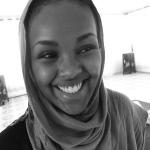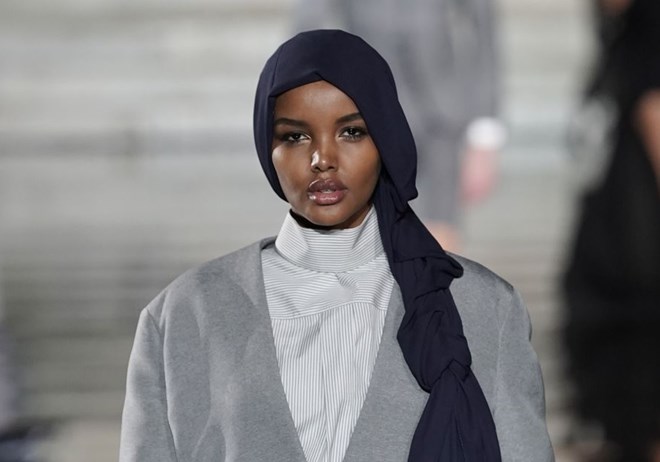
Tuesday September 27, 2022
'You’ll never catch me on a catwalk ever again,' the philanthropist told us during the recent One Young World summit.

VITTORIO ZUNINO CELOTTOGETTY IMAGES
'I am quitting, and you guys have 24 hours to release me from all contracts,' Halima Aden recalled of her abrupt announcement in 2020 that she was leaving the fashion industry for good.
At the time, the UNICEF ambassador explained her decision via an Instagram story, noting: 'Looking back now I did what I said I would never do. Which is compromise who I am in order to fit in. Just remember they call it a "hijab journey" for a reason and it is never too late to reinstate your boundaries.'
Now, aged 24-year-old, Aden is using her platform on her own terms. ‘You’ll never catch me on a catwalk ever again,' she recently told ELLE UK during the One Young World summit, the annual leadership event, attended by Prince Harry and Meghan Markle, for which the former model served as a counsellor. 'I’m not even going to enter those [modelling] spaces... I’m done with traditional modelling,' she continued.
Born in a refugee camp in Kakuma, Kenya after her mother fled Somalia, Aden arrived in the US when she was seven years old. She was part of a rare minority of Somalians who were able to relocate to another country at the time while the majority of refugees remained in camps, or were deported back to their home countries.
Aden's modelling career kicked off in 2016 when she took part in the Miss Minnesota USA pageant, and received international praise for wearing a hijab and burkini, a full body swimsuit. Thereafter, she was scouted to be a model and asked to meet with world-renowned talent and model agency IMG Models, at which point she laid out her working conditions. They included being able to wear her hijab at all times, not revealing her skin, having a private dressing space and having her female manager dress her on set, which the agency agreed to. It wasn't long before she made her NYFW runway debut in 2017 for Yeezy, and became the first person to wear a hijab on the cover of Sports Illustrated two years later.
It was during the pandemic, however, that Aden began to reassess her career, and ultimately came to the realisation that she no longer wanted to model. Reflecting on her time in front of the camera and on the runway, Aden told us of how accepting the fashion industry was of her Muslim values in the early years of her career. ‘I will admit the industry has been very good to me,' she said. 'Every single boundary I had was followed. I was probably the first model to have a hijab clause in my contract. Before I stepped foot onto a photoshoot or runway, everyone already knew I needed my private dressing space. Believe it or not, this isn’t something that’s common in the fashion industry.'
On the contrary, Aden recalls several instances when she witnessed other less high profile Muslim models being treated unfairly on set, and being forced to undress in public, despite such actions going against the teachings of Islam. She also recalled photographers often insisting that models change in front of others as a matter of urgency. 'I think it’s just a lame excuse - it’s laziness,' she said, adding of the models she worked with: 'They couldn’t speak up and say “I don’t feel comfortable."'
While intimidation and fear seemingly played a role in silencing her fellow Muslim models from speaking out against injustices, Aden highlighted that many of them feel powerless to do so because they are the breadwinners for their families. In 2018, the year after Aden's runway debut, just three Muslim models walked the catwalk during Milan Fashion Week in 2018, and only two - one of which was Aden - wore a hijab. 'There’s a small number of [Muslim] models who are very successful... but 90% are struggling to make their way,' she continued. 'They’re not going to speak up at a shoot or a runway show because, for a lot of these girls, it’s make or break. A whole family might be relying on them.’
While several models, including the likes of Emily Ratajkowski and Joan Smalls, over the years have called out issues such as sexual harassment, sexism and racism in the fashion industry, Aden admitted that it often sadly goes against the grain to highlight the injustices they've suffered or borne witness to.
'Big name models have privately DM’d, called, texted and just thanked me for speaking up, because it’s unheard of,' she added. 'Usually the fashion industry washes their hands of models, and replaces them with quite literally the "newer model". So it’s rare for somebody, like myself who came from a refugee background and a very poor family, to step away from high fashion.'
Aden is proud that many Muslim models have followed in her footsteps, and have seen her as a beacon of hope in a bid to improve diversity in the fashion industry. However, she is concerned that Muslim models are often viewed as ‘tokens’ and face varying degrees of acceptance. ‘[Casting agents] like to have us girls to be like "Oh, look at how far we’ve come for diversity and inclusion". But the reality is that not all models get treated fairly… you’re either going to treat us all the same or I’m out. There’s no favouritism,' she outlined.
During the first two years of Aden's modelling career, she recalled always having to be prepared to cover her head. 'I didn’t leave it to chance,’ she said. ‘I was bringing a big suitcase full of hijabs, extra fabric, tights, leggings… you name it I had it.’ However, at the age of 21, she increasingly found herself being part of ‘questionable shoots’. On one occasion, she was forced to resort to using a pair of jeans as a makeshift hijab. ‘I was thinking to myself: This isn’t how the majority of hijab-wearing women would like to be represented. This is not a hijab.’
Big name models have privately DM’d, called, texted and just thanked me for speaking up
While the presence of hijabs have increased in recent years in fashion, from Indonesian Muslim designer Anniesa Hasibuan’s catwalk shows to Nike’s made-for-athletes hijab, Aden is wary of the fashion industry attempting to ‘water down’ the hijab ‘so it can fit into the mainstream’. ‘It’s hard to be traditional hijab-y, [like] the way I’m wearing my hijab now,’ she told us. ‘Right now the turban is “in”, which I don’t have a problem with as I like to wear a turban too, but it’s a problem when it’s the only form of [head coverage] the industry wants to see. I want to know that people will accept me in my most traditional of hijabs.'
Since leaving the modelling world in 2020, Aden has been using her voice to encourage people across the US to support UNICEF, and raise awareness to programmes that save and protect children’s lives.
While she’s grateful to the fashion industry for launching her career, the former model is focussed on highlighting global issues that are more in line with her values. ‘It was what my soul was so desperately craving for,’ she says of her philanthropy. ‘I was so sick of “get a make-up contract, be on this runway, be on this photoshoot…”. It’s not what I want with my life.'